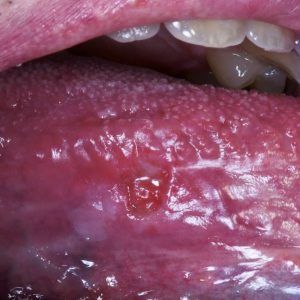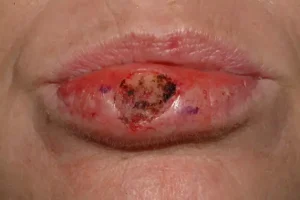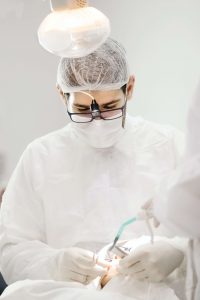
Table of Contents
ToggleWhy is oral cancer screening important?
What is oral cancer?
Oral cancer is cancer in any part of the mouth; the lips, tongue, gums, throat and the jaw. It is a potentially deadly disease that can affect all ages and especially increases risk with age.
When cells become abnormal and grow uncontrollably and turn into cancer. They have the potential to be malignant and spread to other parts of your body.
Most oral cancers are called squamous cell carcinoma and they tend to spread quickly. Which is why screening by your dentist and early detection is important for a better prognosis in treatment outcome.
The average survival rate is approximately 50% over 5 years. This is due to a variety of lifestyle risks and it may not cause obvious symptoms until it becomes advanced.
If you are concerned please speak to our team at Bella Dental.
What are symptoms of oral cancer?

Oral cancer can appear as white or red patches, a lump or swelling, an ulcer that isn’t healing and sometimes it has no symptoms and is painless. This is why oral cancer screening is so important for early detection.
Not all of the following symptoms are cancerous, however, if you do experience any of the following please contact us to conduct a proper examination for you.
- Unexplained ulcer that hasn’t healed in two weeks or more
- Lumps or swelling in the mouth and/or neck
- Persistent white or red patches
Risk factors for oral cancer
Mouth cancers are mostly linked to smoking and excessive alcohol consumption amongst other lifestyle factors. It is best to try and adjust your lifestyle choices to minimise the risk of oral cancer. These include:
Age

With age comes higher risk of developing oral cancer. The average age of people getting oral cancer is 63.
Lifestyle Factors

Smoking, vaping and Areca nut chewing or marijuana use exposes the mouth and lungs to chemicals which burns and causes damage to the epithelial cells of the mouth.
Alcohol

We know that consuming alcohol comes with its health risks. Cancer increases with long-term consumption of alcohol and even light drinking such as one drink per day, has been linked with oral cancer.
Human Papilloma Virus (HPV) and Oral Sex

Human Papilloma Virus is a sexually transmitted disease. People who have been diagnosed with HPV oral cancers are usually younger in age. The type of cancer HPV tends to cause is throat cancer (oropharyngeal). It can affect both sexes and it is best to be proactive and visit the dentist regularly for screening.
Sun Exposure – Skin Cancer

UV rays from the sun also damage the skin on the lips. It is important to wear SPF protection on your lips as well as your skin such as lip balms with SPF in them. Lip cancer warning signs include, red or white patch on the lips which then becomes itchy or crusty, bleeds or swell and open sores which aren’t healing. If you notice any changes to your lips please contact us for a thorough exam.
Previous cancer diagnosis or genetics
With previous cancer diagnosis and or cancer treatment such as radiotherapy or chemotherapy, the risks of developing oral cancer is high. Prioritise regular screening with the dentist.
What to expect during an oral cancer screen exam?

It is important to detect any oral lesions early on that could become oral cancer in order to improve long-term outcomes. Lesions, bumps and sores could be abnormal cells that are not cancerous but could into cancer known as pre-cancerous lesions. During your regularly 6-monthly dental check-up appointment, our team will do a comprehensive examine the whole mouth including; your lips, inside the cheeks, back of the throat, the roof and floor of your mouth, your tongue, gums and lymph nodes in the neck. We aim to detect oral cancer and abnormalities early and advise you the next steps accordingly.
Contact our team for further information or to book an appointment at https://www.belladental.com.au/contact-us/






